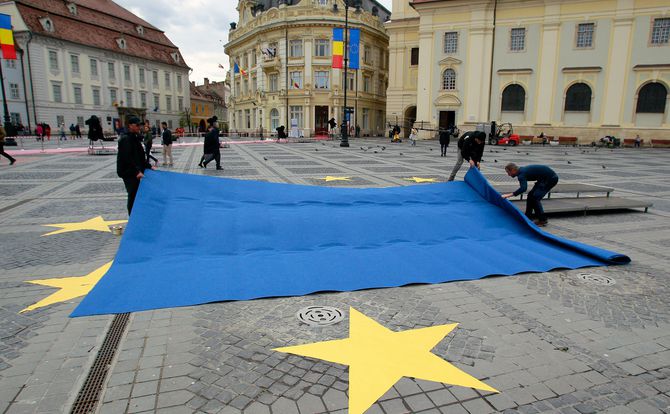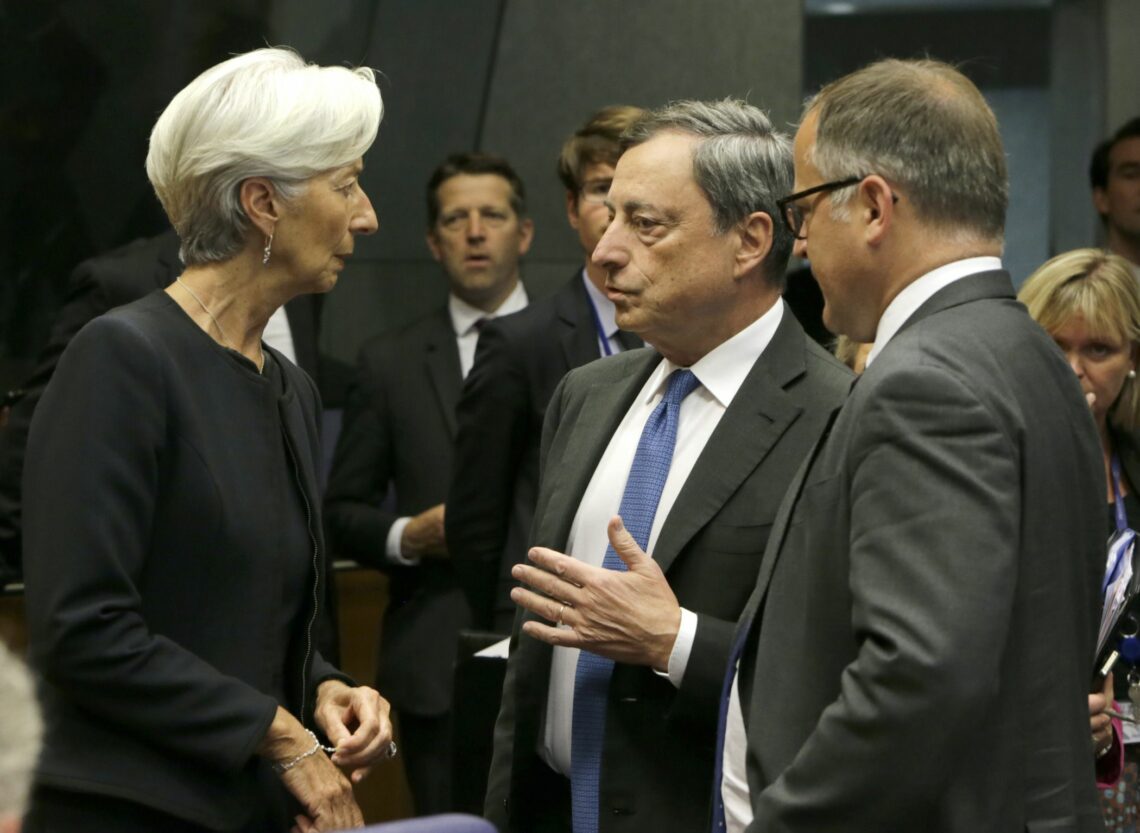After the Great Fear: The EU’s Sibiu agenda
EU leaders heaved a sigh of relief after the 2019 European Parliament elections when the much-feared populist wave failed to rock the boat. Yet at most, they have gained a little time. Judging by the tone of the informal summit held in Sibiu, Romania, the EU’s new leadership will favor old narratives over new strategies.

In a nutshell
- EU leaders felt relieved to avoid a populist wave in the European Parliament elections
- Their new hand-picked team inherits the same formula of redistribution and regulation
- Further inertia in Brussels will only breed more discontent among EU citizens
The main takeaway from May’s European Parliament elections is that the populist wave failed to rock the boat. Certainly, populist agendas won in important European Union member states such as France, Hungary and, to some extent, Italy. Yet these victories were hardly explained by strong anti-EU or anti-euro agendas. Instead, the results at the ballot box revealed the weakness of the populists’ more established opponents (here the misfortunes of Emmanuel Macron and Silvio Berlusconi are instructive) and how the public felt about domestic issues, such as security and immigration. Nobody cared about quantitative easing, the EU budget, policy toward large corporations, the 10 billion-euro annual cost of the EU bureaucracy, or the enormous boondoggle that is the Common Agricultural Policy (which accounts for about 36 percent of EU spending).
EU politicians and bureaucrats would be wrong in applauding and celebrating the electoral outcome as if voters had rallied to their support. What they can do is breathe a sigh of relief, because they avoided a clear vote of no confidence. The electoral verdict gives the EU authorities sufficient strength and time to reconsider the Union’s role in foreign affairs and economic matters, two areas in which it has been clearly deficient.
The new leadership’s baseline scenario is to stick to the old narrative.
Furthermore, the election shed new light on Brexit and potentially could make it less disruptive. With Brussels no longer obliged to flex its muscles, the United Kingdom’s departure from the fold will increasingly appear as a British problem, rather than a threat to the European architecture. This perspective change would be a good thing for the UK, which could leave without risking a trade war with the continent. It would also be good for Brussels, which might become more receptive to a soft deal without the need to brace for Armageddon.
Easy agenda
So do these relatively comforting results call for optimism? Not necessarily. They only buy a little extra time to reform the European project, a possibility that depends heavily on who replaces Angela Merkel at the helm of German politics and how well Christine Lagarde handles her new responsibilities at the head of the European Central Bank. In our view, the nomination of Ursula von der Leyen as European Commission president is of relatively minor importance, unless she deliberately sets out to promote an agenda against German interests. Given her nationality, this seems highly unlikely.
Which way will the EU’s new leadership go? Their baseline scenario is to stick to the narrative inherited from the old elite. This approach was summed up nicely by the informal summit of the European Council, which convenes EU heads of state or government, in Sibiu, Romania, on May 9. At this meeting, President Jean-Claude Juncker’s outgoing Commission stated that future EU policymaking should be based on the following pillars: (1) staying united, because size is the key to prosperity in a competitive and uncertain world; (2) protecting the Western way of life; (3) fighting against inequality in the name of social justice; (4) engaging in efforts to create a worldwide regulatory system; and (5) developing solutions to manage climate change. Apparently, competition is not a priority and foreign policy does not count.
The EU agenda is easy and tempts policymakers by enlarging their powers.
For all its grand wording, this is the path of least resistance. It will be tempting to implement, even though it would spell disaster for the entire continent. The agenda is easy because it sounds deceptively unobjectionable and appeals to public opinion; it tempts policymakers by justifying a significant enlargement of their powers. Why this agenda would likely prove disastrous for Europe is more complicated, covering a variety of reasons.
Contradictory thinking
For all its fascination, size matters economically only in a world dominated by trade barriers. Ceteris paribus, the larger a free trade area, the lower the cost of not being able to trade outside of it. Size does not make European entrepreneurs more competitive but merely softens the impact of anti-trade policies.
Arguing for size and globalization at the same time is almost a contradiction in terms. It creates confusion and encourages rent-seeking groups that regard globalization as a game among global players (rather than between competing entrepreneurs). Ultimately, what these rent-seekers want is protectionism in one of its guises (e.g., to fight social dumping and other forms of allegedly unfair behavior).
Dual-purpose expressions satisfy everybody and justify all kinds of arbitrary policies.
“Safeguarding our way of life” and “protecting our values and freedoms” are dual-purpose expressions that satisfy everybody but could also serve to justify all kinds of arbitrary policies. For example, instead of providing a specific road map for integrating immigrants, the agenda suggests that new subsidies and policies (and thus new expenditures) are needed to preserve or promote whatever the authorities in Brussels deem “Western.”
Recipe for tension
Fighting inequality is another crowd-pleaser, since it gives the impression that large numbers of people will be rendered better off at small cost (in the case, by a tax on the rich). Yet focusing on redistribution would be self-defeating on two counts.
First, it implicitly assigns to the European project a role – income and wealth redistribution – that is not part of its core business. The Union’s purpose is to create opportunities for low-income citizens to enhance their living standards, not to soak the rich just because they are wealthy, and transfer resources to the poor whose only merit is their poverty. This is absurd and unjust.

Moreover, the proposal shows that the EU still has no clear ideas about how to create a healthy business environment where entrepreneurs are comfortable investing money, founding companies and creating jobs. A program designed to look for ways to share the cake, rather than baking more of it, is a recipe for tension and stagnation. Robust doses of regulation and harmonization will only make things worse, stoking further discontent.
Regulatory expansion
For one simple reason, there is a fairly high probability that the (informal) Sibiu agreement will define the agenda of the European Commission and Parliament. The elections left the EU bureaucracy untouched. Unless the Commission has strong leadership composed of prominent, like-minded politicians with a clearly defined and broadly shared project – which they are willing to push through against their own departments – then it will be business as usual. There could be some cosmetic adjustments to stroke the egos of the incoming ministers. This happens all the time in the national governments. It will happen at the Union level as well.
Will the wind of change blow from Frankfurt, where the European Central Bank is based? Outgoing President Mario Draghi recently admitted that the ECB’s monetary policy has been at least a partial disappointment. In particular, low interest rates have hurt savers and commercial banks while failing to promote sustained growth: the euro area’s economy slowed from 2.4 percent annual growth in 2017 to 1.8 percent in 2018 and a forecast 1.2 percent this year. Besides, the ECB is now short of ammunition should it decide to resort to a new round of easy money – as Mr. Draghi signaled at the press conference following the June policy meeting.
If the ECB is allowed to expand its influence, it is hard to imagine the Commission taking a different tack.
The central bank’s lack of ammunition may actually be good news. The bad news, however, is that Ms. Lagarde, when she takes over from Mr. Draghi on November 1, could keep interest rates where they are and resort to a new wave of regulatory measures instead. That had already seemed a possibility because her main rival for the ECB’s top post, Finland’s Erkki Liikanen, had acquired a well-earned reputation for loving regulation and centralized supervision after presiding over the 2012 expert report on banking reform that bears his name. Further action in that spirit would dampen euro-area growth and reinforce those who believe the EU should become an even more comprehensive regulatory authority.
If the central bank is allowed to expand its influence, it is hard to imagine the Commission taking a different tack. The very fact that another contender for the ECB presidency, Jens Weidmann, now believes that the purpose of central banking includes bailing out troubled countries shows which way the wind is blowing. Since Ms. Lagarde, for all her experience, is a lawyer rather than an economist, it is by no means clear whether she will resist such views from her new colleagues.
Scenarios
Rather than presenting an opportunity to conceive new strategies, we suspect that the Great Fear has merely encouraged the EU authorities to keep living in the moment. The arrival of a new cohort of commissioners will hardly change this picture. Size and cohesion matter when one has a clear foreign policy. If such a policy is lacking, they turn into inertia – a liability.
The risk we run is confronting a future EU project focused on redistributing and regulating, which is not what Europe needs today. Although the Great Fear is behind us, and the populists have been at least temporarily checked by their failure to produce a credible alternative, we may expect that more and more disgruntled Europeans will look for ways to express their discontent.







